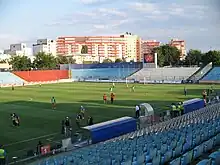英語
詞源
源自古希臘語 (stádion)。
名詞
(複數)
- 古希臘里(長度單位),等同於600古希臘尺(podes),約合現代185.4米。
- 1883: Franz von Reber (translated by Joseph Thacher Clarke), History of ancient art, p257 (S. Low…)
- The stadion did not suffice for the races of horses and chariots which had been favorites with the Greeks since the Trojan war.
- 1993: David Gilman Romano, Athletics and Mathematics in Archaic Corinth: The Origins of the Greek Stadion, p1 (Diane Publishing Co.; ISBN 0871692066 (10), ISBN 978-0871692061 (13))
- The stadion was used specifically for human athletic contests whereas the Greek hippodrome and later the Roman circus were used for equestrian events. The gymnasion and the palaistra were used for training purposes for human athletic events.
- 2001: Edward Seldon Sears, Running Through the Ages, p26 (McFarland, ISBN 978-0-7864-0971-6
- Stadion Race (200 meters)
- The winner of the Stadion race could justifiably be called the fastest man in the Greek world. According to legend, Herakles, whose feet were 0·32 meters (12·7 inches) long, stepped-off the Stadion at Olympia. Since he chose a distance of 600 “feet”, this made the race at Olympia 192 meters. Herakles staged a race for his brothers, the Kouretes, and crowned the victor with a branch of wild olive. Although the Greek Stadion race was always 600 feet, other Greek gods had “feet” of different lengths. This caused the length of the Stadion race to vary slightly from stadium to stadium. This list of Olympic victors compiled by Hippias in about 400 B.C. lists the Stadion race as the only event in the first 13 Olympic games. Coreobus of Elis, a cook, was the victor in the Stadion race in 776 B.C. and thus the first recorded Olympic victor.
- Stadion Race (200 meters)
- 1883: Franz von Reber (translated by Joseph Thacher Clarke), History of ancient art, p257 (S. Low…)
相關詞彙
異序詞
- ,
阿塞拜疆語
名詞
(定指賓格,複數)
變格
| stadion的變格 | |||
|---|---|---|---|
| 單數 | 複數 | ||
| 主格 | stadion | stadionlar | |
| 定賓格 | stadionu | stadionları | |
| 與格 | stadiona | stadionlara | |
| 方位格 | stadionda | stadionlarda | |
| 奪格 | stadiondan | stadionlardan | |
| 定屬格 | stadionun | stadionların | |
| stadion的所有格形式 | |||
|---|---|---|---|
| 主格 | |||
| 單數 | 複數 | ||
| mənim (“我的”) | stadionum | stadionlarım | |
| sənin (“你的”) | stadionun | stadionların | |
| onun (“他/她/它的”) | stadionu | stadionları | |
| bizim (“我們的”) | stadionumuz | stadionlarımız | |
| sizin (“你們的”) | stadionunuz | stadionlarınız | |
| onların (“他/她/它們的”) | stadionu 或 stadionları | stadionları | |
| 賓格 | |||
| 單數 | 複數 | ||
| mənim (“我的”) | stadionumu | stadionlarımı | |
| sənin (“你的”) | stadionunu | stadionlarını | |
| onun (“他/她/它的”) | stadionunu | stadionlarını | |
| bizim (“我們的”) | stadionumuzu | stadionlarımızı | |
| sizin (“你們的”) | stadionunuzu | stadionlarınızı | |
| onların (“他/她/它們的”) | stadionunu 或 stadionlarını | stadionlarını | |
| 與格 | |||
| 單數 | 複數 | ||
| mənim (“我的”) | stadionuma | stadionlarıma | |
| sənin (“你的”) | stadionuna | stadionlarına | |
| onun (“他/她/它的”) | stadionuna | stadionlarına | |
| bizim (“我們的”) | stadionumuza | stadionlarımıza | |
| sizin (“你們的”) | stadionunuza | stadionlarınıza | |
| onların (“他/她/它們的”) | stadionuna 或 stadionlarına | stadionlarına | |
| 方位格 | |||
| 單數 | 複數 | ||
| mənim (“我的”) | stadionumda | stadionlarımda | |
| sənin (“你的”) | stadionunda | stadionlarında | |
| onun (“他/她/它的”) | stadionunda | stadionlarında | |
| bizim (“我們的”) | stadionumuzda | stadionlarımızda | |
| sizin (“你們的”) | stadionunuzda | stadionlarınızda | |
| onların (“他/她/它們的”) | stadionunda 或 stadionlarında | stadionlarında | |
| 奪格 | |||
| 單數 | 複數 | ||
| mənim (“我的”) | stadionumdan | stadionlarımdan | |
| sənin (“你的”) | stadionundan | stadionlarından | |
| onun (“他/她/它的”) | stadionundan | stadionlarından | |
| bizim (“我們的”) | stadionumuzdan | stadionlarımızdan | |
| sizin (“你們的”) | stadionunuzdan | stadionlarınızdan | |
| onların (“他/她/它們的”) | stadionundan 或 stadionlarından | stadionlarından | |
| 屬格 | |||
| 單數 | 複數 | ||
| mənim (“我的”) | stadionumun | stadionlarımın | |
| sənin (“你的”) | stadionunun | stadionlarının | |
| onun (“他/她/它的”) | stadionunun | stadionlarının | |
| bizim (“我們的”) | stadionumuzun | stadionlarımızın | |
| sizin (“你們的”) | stadionunuzun | stadionlarınızın | |
| onların (“他/她/它們的”) | stadionunun 或 stadionlarının | stadionlarının | |
捷克語
其他寫法
名詞
m 無生
變格
丹麥語
名詞
n (定單數,不定複數,定複數)
荷蘭語
發音
音頻: (檔案) - 斷字:sta‧di‧on
名詞
n (複數,指小詞)
芬蘭語
詞源
源自古希臘語 (stádion)。
發音
- 國際音標(幫助):/ˈstɑdion/, [ˈs̠t̪ɑdio̞n]
- 韻部:-ɑdion
- 斷字(幫助):sta‧di‧on
名詞
變格
| stadion (Kotus 變格類型 6/paperi,無層級變化)的變格 | |||
|---|---|---|---|
| 主格 | |||
| 屬格 | |||
| 部分格 | |||
| 入格 | |||
| 單數 | 複數 | ||
| 主格 | |||
| 賓格 | nom. | ||
| gen. | |||
| 屬格 | |||
| 部分格 | |||
| 內格 | |||
| 出格 | |||
| 入格 | |||
| 所格 | |||
| 奪格 | |||
| 向格 | |||
| 樣格 | |||
| 變格 | |||
| 具格 | — | ||
| 缺格 | |||
| 共格 | — | ||
| stadion 的所有格形式 (變格類型 paperi) | ||
|---|---|---|
| 所有者 | 單數 | 複數 |
| 第一人稱 | ||
| 第二人稱 | ||
| 第三人稱 | ||
近義詞
- (體育場): 〈罕/旧〉
異序詞
匈牙利語
詞源
發音
- 國際音標(幫助):[ˈʃtɒdijon]
- 斷字:sta‧di‧on
- 韻部:-on
名詞
(複數)
變格
| 變格 (詞幹:-o-,元音和諧律:後) | ||
|---|---|---|
| 單數 | 複數 | |
| 主格 | ||
| 賓格 | ||
| 與格 | ||
| 工具格 | ||
| 因果格 | ||
| 轉移格 | ||
| 到格 | ||
| 樣格-形式 | ||
| 樣格-情態 | — | — |
| 內格 | ||
| 頂格 | ||
| 接格 | ||
| 入格 | ||
| 上下格 | ||
| 向格 | ||
| 出格 | ||
| 上格 | ||
| 奪格 | ||
stadion 的所有格形
|
派生詞
參考資料
- ↑ stadion in Zaicz, Gábor (ed.). Etimológiai szótár: Magyar szavak és toldalékok eredete(《詞源詞典:匈牙利語單詞和詞綴的起源》),布達佩斯:水墨出版社(Tinta Könyvkiadó),2006, ISBN 9637094016. (參見其第二版。)
拓展閱讀
- stadion in Bárczi, Géza and László Országh: A magyar nyelv értelmező szótára (匈牙利語解釋詞典). Budapest: Akadémiai Kiadó, 1959–1962.
書面挪威語
名詞
n (定單數,不定複數,定複數)
新挪威語
名詞
n (定單數,不定複數,定複數)
波蘭語

stadion
詞源
源自古希臘語 (stádion)。
發音
- 國際音標(幫助):/ˈstad.jɔn/
名詞
m 無生
變格
拓展閱讀
- 參見波蘭語詞典PWN上有關stadion的內容
羅馬尼亞語

stadion
詞源
借自德語 。
名詞
n (複數)
變格
塞爾維亞-克羅地亞語
詞源
源自古希臘語 (stádion)。
名詞
m (西里爾字母拼寫)
變格
stadion 的变格
| 单数 | 复数 | |
|---|---|---|
| 主格 | stadion | stadioni |
| 属格 | stadiona | stadiona |
| 与格 | stadionu | stadionima |
| 宾格 | stadion | stadione |
| 呼格 | stadione | stadioni |
| 位格 | stadionu | stadionima |
| 工具格 | stadionom | stadionima |
瑞典語
名詞
n 或 c (定單數,不定複數,定複數)
This article is issued from Wiktionary. The text is licensed under Creative Commons - Attribution - Sharealike. Additional terms may apply for the media files.